As cynical one might feel about reissues, however, they can sometimes be nothing short of stellar, absolutely warranted, and in the case of much out of print early Autechre, long overdue. For the longest time there’s been something incongruous about the idea of listening to Autechre on vinyl, a medium whose inherent limitations Booth and Brown’s bleeding edge tendencies are rapidly outgrowing. No pointless remastering, colored vinyl or bonus material nobody asked for, just high spec, faithful recreations of the original vinyl releases.
Reissues! Reissues! Buy us! We’re new (but old) and improved (though often not), with bonus material never before heard (sometimes with good reason) all lovingly remastered (well, made louder) and pressed (often badly) on expensive “heavyweight” 180g vinyl (for little tangible benefit).
You can’t move for reissues in these rose-tinted days of vinyl-buying (but rarely playing) hipsters and nostalgia junkies, with even the trend-snorting major labels shoving their coked up asses onto an already overstuffed bandwagon to charge an arm and a leg for what you could have picked up years ago for a fraction of the cost.
As cynical one might feel about reissues, however, they can sometimes be nothing short of stellar, absolutely warranted, and in the case of much out of print early Autechre, long overdue. For the longest time there’s been something incongruous about the idea of listening to Autechre on vinyl, a medium whose inherent limitations Booth and Brown’s bleeding edge tendencies are rapidly outgrowing.
Those physical media were, however, a beautiful extension of the duo, exquisitely rendered by the meticulous work of The Designers Republic or Richard Rutterford and affording the listener a sense of ownership so many still seek and don’t find with digital. The release of their first three albums represents what is hopefully the first phase in a larger campaign to get Autechre back out there on the actual shelves of shops and listeners alike.
And thankfully, Warp have done a beautiful job. No pointless remastering, colored vinyl or bonus material nobody asked for, just high spec, faithful recreations of the original vinyl releases.
Incunabula, plural noun: the earliest stages or first traces of anything
[Bleep] Let’s not get all revisionist about this; Autechre’s debut album may be the second-most atypical in existence, but there was a time when it was the definitive statement of who they were. Like much of Warp’s output back then, the majority of entries in the Artificial Intelligence series from the likes of B12, Speedy J and Richie Hawtin’s F.U.S.E. owed a far greater debt to techno, acid house and the rave scene than to hip-hop.
While the latter is a far more prominent influence on later Autechre records, Incunabula is no exception and there’s been much speculation about whether it was carefully curated specifically to fit in with the pioneering Artificial Intelligence series it helped to define.
“Kalpol Introl” is a perfectly judged introduction, but the album doesn’t capitalize on it in the way it could, following it up with “Bike,” “Autriche” and the subaquatic bubble of “Bronchus 2,” a pacing mistake that lends credence to the argument that perhaps Incunabula is simply too long. It culminates, however, in the much loved and lighter “Eggshell,” an archetypal instance of that armchair listening techno Warp hinted at with the cover of the first Artificial Intelligence compilation.
Obvious single choice “Basscadet” sounded like nothing else at the time: the clattering percussion, angular fx glittering like a torrent of iron shards, the stark, dehumanized sound design and complex, layered arrangements. The almost Arabic melodic modes of the pummeling and metallic “Maetl” occupy similar territory, as does “Doctrine” that, while using tempo-doubling techniques that sound familiar—even clichéd—today, felt like the cutting edge back then and were narcotically addictive.
That strange curation makes itself felt again later on with the panoramic but overlong, eleven minute “Windwind” lacking progression, and who the hell knows what the loungey “Lowride” is even doing squatting near the end here, diluting the emotional impact of the spectacularly tragic and introspective class act “444.”
Got a copy of the lovely silver vinyl edition of the original 2xLP that sounds so terrible you can’t bear to actually play it? Then this reissue is also for you. Has Incunabula dated? Well sure, but not that badly, and how much music genuinely doesn’t anyway? Find something to toke on, then sink into that armchair and lose yourself in the early roots of Autechre.
Autechre, in Amber clad
[Bleep] Autechre’s sophomore album landed almost exactly a year after Incunabula and saw them striking out in a markedly different direction. There’s a deep-rooted traditional melodic structures, emotional content, strings that actually sound real, all wrought in starkly minimal sound design. It’s clear why some Ae fans are utterly turned off by this album. What isn’t as clear is why more aren’t, other than, you know, it’s Autechre, it’s got to be good right?
The prominent techno influences of previous work have been roundly stripped back, the production now minimal to the point of surgical. The first buds of a sound that would come to typify later releases are revealed. There’s also no denying it, Amber is just out-and-out fucking beautiful, and not in that “my god, imagine the algorithms and programming needed to create this multidimensional matrix of sound design” kind of way.
The UFO power-core thrum of the mysterious “Foil” gives absolutely no indication of what to expect from the rest of Amber, and the clack and clatter of “Montreal” with its minimal strings and music-box tines are not light years away from what came before. But think about it: “Silverside” exists in Autechre’s canon. There’s nothing else quite like it. What could be actual strings sweep majestically across a chrome landscape covered with slowly rippling pools of magnesium. There’s the disconcerting buzz of some giant insect, strangled and distorted gargling, the thwack of bending sheet metal percussion. And at its close, the whole thing falls in gentle slow-motion into a string-soaked, echoing valley of rippling mercury. But it gets better.
“Piezo” is as close to perfection as music gets. It shouldn’t be possible to categorize a track characterized by something as caustic as the relentless, rolling, mechanized percussion and strangulated, guttural vocal burbles as ambient, yet Autechre set these elements against the most dreamlike, spectral FX tendrils and somber synth string washes doused in more wells of reverb to create something uniquely transcendent and unequaled even today.
“Slip” is as cheerfully playful as Autechre ever get, but is underpinned by exquisitely layered percussive loops, “Glitch” sparks with blue static electricity like a Van de Graaff Generator and the ten-minute “Further” describes a stalagmite-ridden cavern dripping with icy water. Even when Autechre go all out melodic on “Nil” everything is drenched in reverb and delay. Only the noodling “Nine” and out-of-place masonry-crunching “Teartear” feel vaguely out of place.
Amber hasn’t dated anywhere near as much as Incunabula, and to this day remains a unique entry in their discography, from that conventional but stunning photographic artwork recreated here on the beautiful gatefold sleeve that cleverly obfuscates exactly what it is you’re looking at until closely inspected, through to the ambient, almost neo-classical nature of its Junoesque content.
If you only buy one of this first batch of Autechre reissues, make it Amber.
Tri-Repetae, or “How America learned to love Autechre”
[Bleep] Another year later and Booth and Brown showed no signs of slowing down, and in a genius move, Wax-Trax! and TVT released the US-exclusive Tri-Repetae++ that included the Garbage and Anvil Vapre EP’s on a bonus disc. Little wonder, then, that this helped to really cement the duo, given the quality of output from an outfit that released some of their finest early work on EPs rather than LPs.
As much as the razor-edged, almost bass-free “Dael” would like to suggest that Tri-Repetae heralds the moment where Autechre excise emotion and ambience from their sound, distancing it from their first two albums, it’s a liar. If anything, it’s as though Incunabula and Amber conceived a baby while listening to hip-hop and it grew up to become a more sophisticated and slightly cynical sibling.
Just listen carefully to that brilliantly curated opening salvo of tracks: a simultaneously cushioning and extremely strong bridge between them. How are the swelling metallic tones, fizzling percussion and emotive violin strings of “Leterel” that different to tracks like “Silverside” or “Piezo?” Surely the brushed aluminum coated bubbles of “Clipper” resemble the reflective sheen of much of Amber whilst also containing a turbo-charged thud that could first be heard on tracks like “Doctrine?”
It’s with the phone-line glitch and chatter of “Rotar” that things take a turn for the stranger, with a Plaid-like ear for melody and rhythm, the crystalline sound of Amber still present. The pace-quickening, pitch-bent madness and frenetic chatter of “Eutow” together with the sub-bass and cavernous soundscapes of “Overand” neatly bookend the smoke-belching funk of “C/Pach” and gastric gurgles in “Gnit.”
The wow and flutter, tinnitus bursts and low-key scissor slicing “Stud” and the delay-drenched outro “Rsdio” both arguably overstay their welcome a little, but in general it’s clear that Tri Repetae is far better paced than previous offerings. Tri-Repetae has certainly stood the test of time a little better than its parents in spite of effectively being a dialed up version of previous glories, and itself spawned one of the duo’s best loved EPs.
No gatefold this time, but a wide-spined outer jacket with slightly but more pleasingly green metallic ink than the original issue plus that black sticker housing two inner sleeves with the disturbing full-color inner artwork. Warp have made sure that in spite of the minimal design, this still looks amazing.
And don’t forget everyone, it’s complete with surface noise.






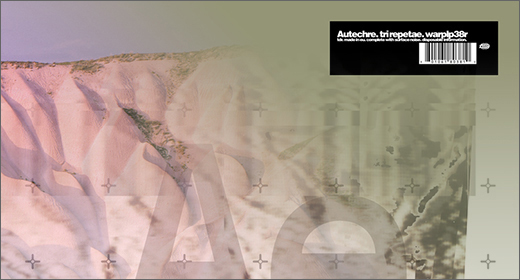





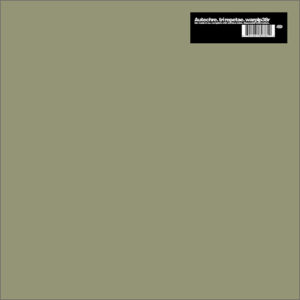
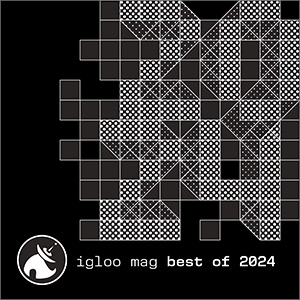
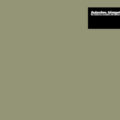
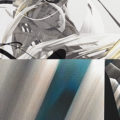
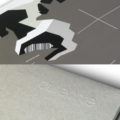
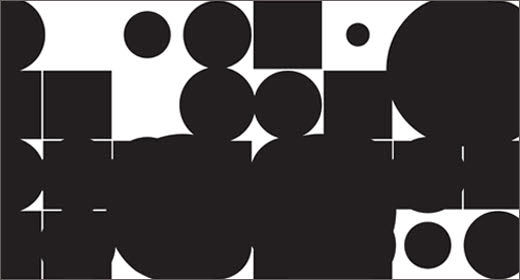
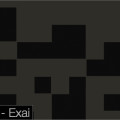




![Luke’s Anger :: Ceiling Walker EP (Love Love) — [concise]](https://igloomag.com/wp/wp-content/uploads/2025/04/lukes-anger-ceiling-walker-vinyl_feat-75x75.jpg)

![Ndorfik & madebyitself :: Solos EP (People Can Listen) — [concise]](https://igloomag.com/wp/wp-content/uploads/2025/04/ndorfik-madebyitself-solos_feat-75x75.jpg)




